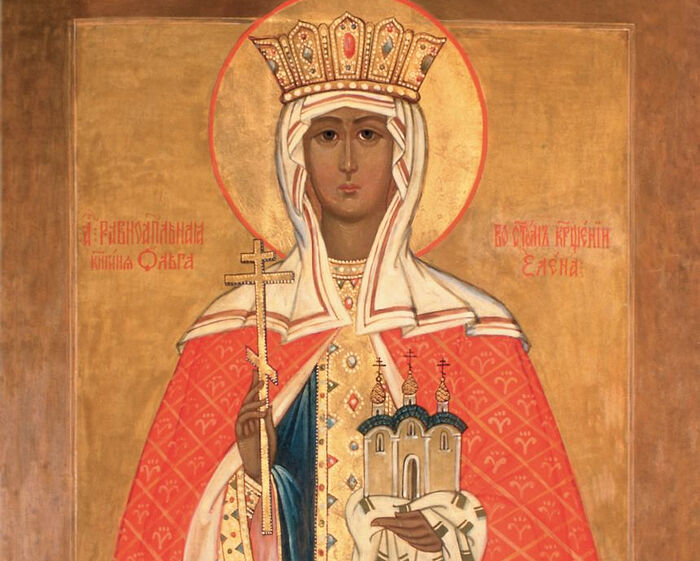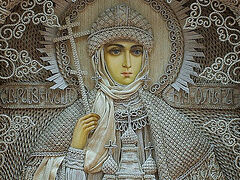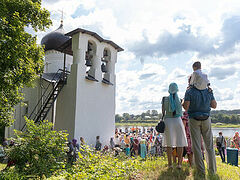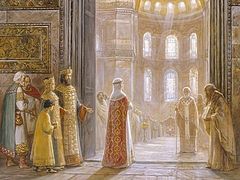Today we glorify the holy Equal-to-the-Apostles Olga, who before the general baptism of Russia by her grandson Vladimir, travelled the cities and countryside, smashing idols and teaching people to worship the One God. How our hearts tremble at the stichera in which the Church sings of this most vitally important need, especially in our times: “Thou didst cast the proud devil out of Russia,” “Thou didst raise the tree of life, the Cross of Christ, in Russia, and open to the faithful the gates of paradise.” The Church calls Grand Princess Olga equal to the apostles and speaks of her wisdom. Not only of her inclination from the start toward higher knowledge, not of her innate chasteness, by which she amazed her future husband, the prince, and not of her other natural virtues. Because for all these excellent qualities, had she not met Christ one day she might have remained in the madness of pagan idol worship to the end of her life. It is same for her grandson Vladimir. And her native intelligence would not only have helped her in military cunning, but would also have devised the most exquisite cruelty, as happened in her revenge against the savage Derevlians for the murder of her husband. But we glorify her for her wisdom in choosing the true faith, thanks to which the beginnings of Orthodoxy were placed in the Russian land. To be more exact, it is for her having chosen the Wisdom of God, as is it says in the church stichera: “Thou didst write of it before: thou art my goodness and beauty.” For whom he did foreknow, he also did predestinate (Rom. 8:29), says the Word of God. And in prayer the Church very specifically delineates the order of her acceptance of good and rejection of evil: “Having received the zeal of the Holy Spirit, thou didst come to hate the evil beliefs of thy fathers.” Therefore let no one be surprised that at the Liturgy for the feast of Equal-to-the-Apostles Olga, the Gospel is read for the salvation not of just anyone, but of the sinful woman (Lk. 7:36–50). Let us contemplate this mystery of salvation, about which the saints continually remind us.
Not because we have fulfilled the Law—the whole Law—do we hope to become righteous and justified before God. Not thanks to our merits, our sacrifices clothed in our virtues do we become sanctified to God. Not at the force of our pushing does the door open to heaven. It itself opens, by the gift of God’s pure grace, through Christ’s death and resurrection for our sakes. Our salvation comes through the pure grace of God, completely undeserved by us, to the measure that we become one with Him in faith. Therefore, freed from sin, justified and enlightened by Christ’s grace we can begin to live according to the law of Christ, the law of the Spirit (cf. Rom. 8:2), the law of freedom (cf. Jas. 1:25), being filled with joyful readiness for any spiritual labor, any sacrifice. We do not become angels, but we obtain wings. Joy and blessedness raise us over our natural strengths. Purity comes, but after faith, after freely given salvation that we receive from God. And our sanctity will always be proportional to our faith in Christ Jesus.
This is just how it happened with the forgiven woman. Not as it is too often understood: That supposedly she was forgiven because she loved much. This would turn love into a condition for forgiveness, into something from which some advantage can be drawn. To the contrary, Christ confirms that much is forgiven her because she testified to having received the gift of Christ’s love. The testimony that she is saved consists in her suddenly showing love for the Savior. Salvation came first, while forgiveness came purely through God’s mercy. Love overflowing came as a result, like a river flowing from its source. The joy of seeing herself freed, the bliss of newly-found purity, and mainly the wondrous revelation that God knows her and loves her, transformed that woman. A new creation was wrought, a true rebirth.
The moral consequences of this cannot but come to the surface: Thy faith hast saved thee, go in peace. That is how it was with the woman caught in adultery: Go, and sin no more (Jn. 8:11). That is how it was for Zacchaeus: Behold, Lord, the half of my goods I give to the poor; and if I have taken any thing from any man by false accusation, I restore him fourfold (Lk. 19:8). This is how it was, how it should be with all of us.
Need we speak also about the law, the prescriptions for observing all external established norms? Yes, where there are no leaves and flowers there can be no fruits. But here we are talking about barren trees. So, all that is external turns out to be beyond the borders of salvation. In any case, our own merits can’t help us at all. We have left the world of calculation. We have entered the world of mercy, forgiveness, and the peace of God. Your faith hath saved thee, says the Lord. What is this saving faith? Why did St. Olga, as well as her grandson Grand Prince Vladimir the enlightener of Russia, prefer Orthodoxy above all else? Tradition has it that at first Olga, and then Vladimir were struck by the beauty of Byzantine divine services. But what beauty are we talking about? Obviously the beauty in which they were allowed to touch the very essence of the true faith.
In those days, the Roman pope made efforts to inculcate his faith and authority in our lands. God’s Providence, which chose the holy Equal-to-the-Apostles Olga and Vladimir, preserved our people. From Catholicism came Lutheranism with all the novelties of the Reformation and distortions of authentic Christianity. We now remember this, because we all know about the extremes of the Catholic and Protestant teachings. At one time, some of them saw in today’s Gospel words of the Savior the possibility of refusing works of salvation—a person no longer has to participate in his own salvation because it can’t be earned in any way. That is how the self-placation is found that says we are already saved, regardless of how we live, because we do not need to fear any sin. And what meaning can the Sacraments have after this? Is there much meaning in them? Others to the contrary saw in this the possibility for salvation by our own merits and indulgences, a return to the system of the Old Testament Law and Temple, which, as the apostle Paul writes in his Epistle to the Galatians, makes Christ’s death of no avail. Orthodoxy offers the true resolution, devoid of dangerous extremes. Yes, the sinful woman is first saved, absolutely freely. Not afterwards, but before. Through receiving this gift, and not by what she can offer as a guarantee. She is saved not by her obvious merits, but only through the grace of Christ.
Just the same, it can’t be said that she received this gift completely for nothing. Didn’t she come to Christ? Why did she come to Him? Wasn’t it because she suddenly saw in Him her only Deliverer? And for what reason did she experience the need to be delivered? Wasn’t it because she was aware of herself as a deeply unhappy, perishing sinner, deprived of joy and light? Is that nothing? Isn’t this humility (the desire for truth and righteousness), courage, a deep human need for true joy, an as yet unconscious yearning to realize her main calling, the ability to ignore “what people will say”, to not be afraid of their contempt, to be higher than the vain judgment of the crowd? You can call this the desperate hope of one who has lost prudent caution through trust in unseen Providence, a cry for help, faith that a person is capable of knowing what higher good is. This is already no small thing, although we could continue to list her “merits”. This is definitely something!
Salvation comes to pass where there is a meeting of human striving for truth with the mercy of divine love. In a union of love, both sides must participate. This is the command that holy Equal-to-the-Apostles Grand Princess Olga leaves to all of us who confess Orthodoxy—that we would apply it to our lives and to everyone in our country until all have found faith, or rejected the old.




